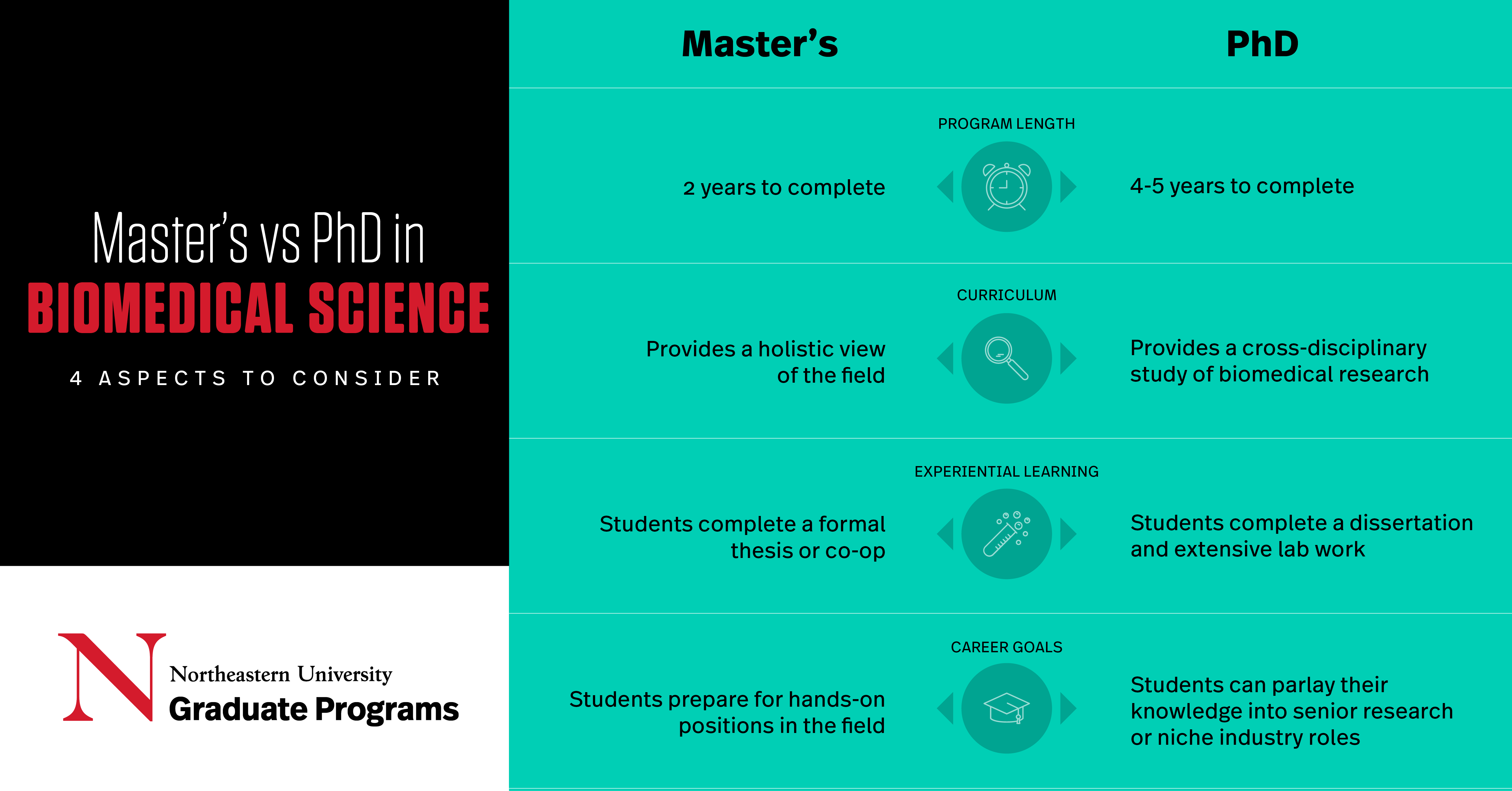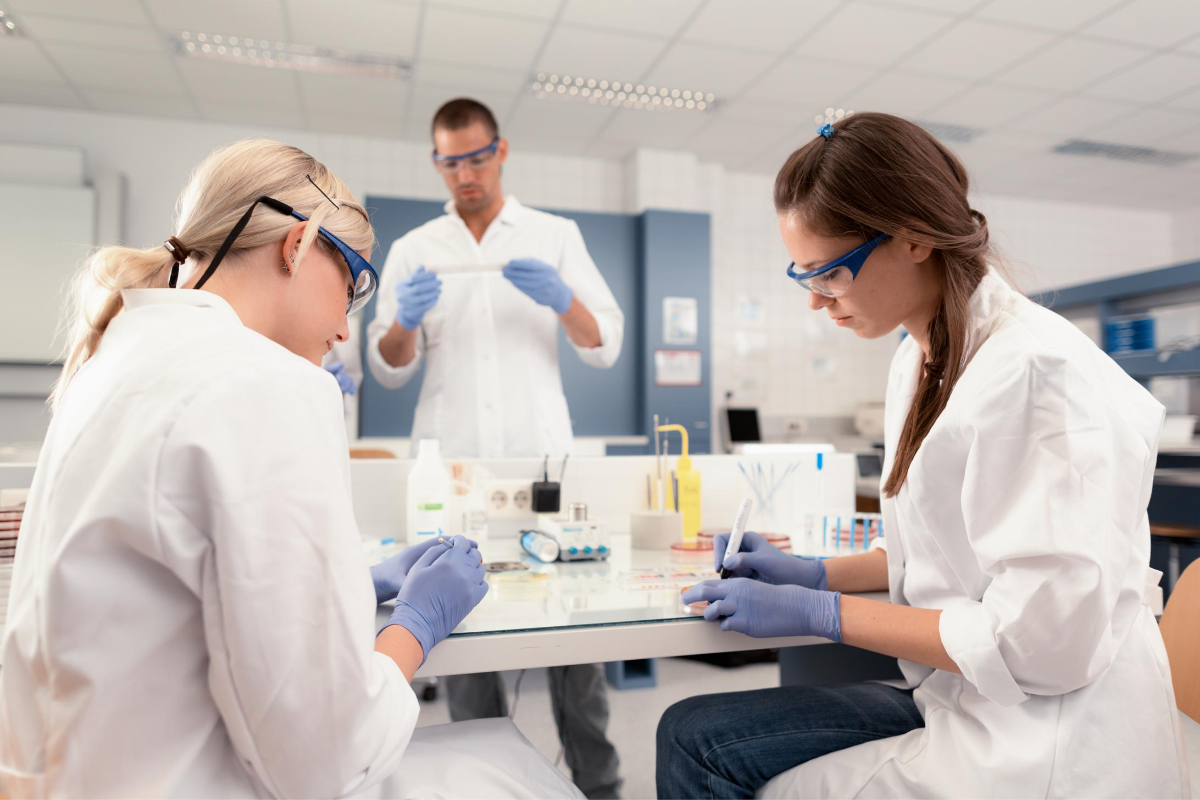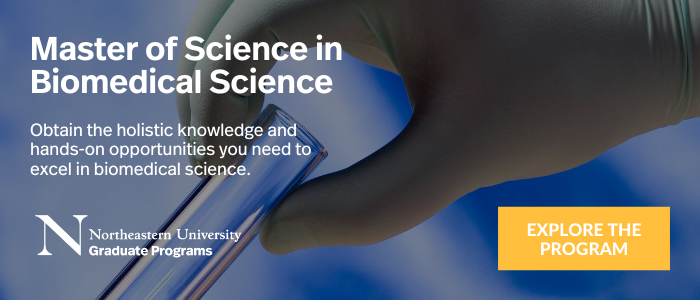An advanced degree is all but required to land a position in the biomedical science field today. However, the depth of study and areas of focus covered during the pursuit of a master’s degree will differ greatly from that of a PhD. For this reason, it’s important that professionals identify their career aspirations within biomedical science, and tailor their choice in degree accordingly.
Below we explore the differences in Northeastern’s biomedical science master’s and PhD programs and offer some advice on carving your path to success in this exciting field.

Pursuing a Master’s in Biomedical Science
How long does it take to complete a master’s in biomedical science?
Northeastern’s master’s in biomedical science program takes an average of two years to complete. The program is designed to help students maintain a work-life balance, offering both full-time and part-time degree options.
What is the curriculum like in a master’s of biomedical science program?
This program is one of four tailored degrees offered within the Department of Pharmaceutical Sciences. Of all the other niche areas of study—which include pharmacology, medicinal chemistry, and pharmaceutical sciences—the master’s in biomedical science program provides the most general and holistic view of the field. The curriculum ranges greatly, exploring fundamentals like pharmaceutical science and biochemistry, to practical applications such as research skills and ethics.
Students also have the opportunity to tailor their education to fit their desired career outcomes at the master’s level.
“We offer a wide variety of electives both within [and] outside of the department,” says David Janero, director of the pharmaceutical sciences graduate program at Northeastern. These courses include those within Northeastern’s pharmaceutical sciences, pharmacology, pharmaceutics, biology, chemistry, nanomedicine, and biotechnology departments.
A Flexible Approach to Learning: Northeastern has designed all pharmaceutical sciences programs to offer the same fundamental courses, so that students can easily transfer their credits within the department if they decide later on that their interests have changed. “I often find that a person coming into the program…has some vague idea of what he or she may wish to do,” Janero says. “And after going through some of the courses, these ideas become refined. The flexibility in Northeastern’s programs is a very important and recognized part of mentorship.”
What are the hands-on opportunities like in a master’s of biomedical science program?
Northeastern’s master’s in biomedical science program offers extensive opportunities for experiential learning—a vital component of training in such a hands-on field.
“Master’s students have two very good opportunities in terms of career building at Northeastern,” Janero says. One option is to do a formal thesis, which can be based on anything from wet-lab research—which is identified by the handling of chemicals and “wet” materials in experiments—to literature—which often includes doing a deep-dive into existing publications on a specific topic. The other option is to spend time working with one of the top biomedical science organizations that make up Northeastern’s expansive professional network as part of a co-op.
Advance Your Career with a Master’s in Biomedical Science
Learn how to transform your career in an industry that’s transforming the world.
“I would say most of our master’s students want to do a co-op, and we have many biotech and pharma companies in the Boston/Cambridge ecosystem that avidly wish to take these students on,” Janero says. “The reputation of the co-op program at Northeastern has been so good that it doesn’t even follow the law of supply and demand…the demand for our students is outstanding in all of our pharmaceutical science programs.”
Did You Know: The Boston/Cambridge area is considered a national hub in the biomedical science industry. As such, Northeastern students have the unique opportunity of not only working with some of the top minds in the field, but developing integral connections with the organizations defining the future of biomedical science.
Alongside getting the chance to work and network with some of the top companies in the industry, students find great value in the chance to apply their skills hands-on during co-op.
“Students may read about this stuff, but to be a part of it and see it in day-to-day operation is unique,” Janero says. “It’s more than learning how the car is driven. You actually get into the front seat, behind the wheel, and I think that’s really important for students at the [graduate] level.”
What kind of career outcomes can graduates of a master’s in biomedical science program expect?
A master’s degree in biomedical science is designed to prepare professionals for hands-on positions in the field. Individuals at this level are likely to pursue “a technical-level position at the bench in a laboratory, actively doing research,” Janero explains.
He notes that graduates of a master’s biomedical science master’s program can also parlay their knowledge into a role outside of the lab. Most often these individuals will have additional training or backgrounds in the application of biomedical science—such as marketing, legal, sales, etc.—that they wish to work in.
Some of the top positions for those with a master’s in biomedical science include biomedical laboratory technician, biomedical scientist, clinical research associate, medical writer, and medical chemist.
Pursuing a PhD in Biomedical Science
How long does it take to complete a PhD in biomedical science?
It can take four to five years for students to complete a PhD program in biomedical science.
In some cases, however, students who have already completed their master’s can fast-track the completion of their PhD within the same university. This occurs most often at universities (like Northeastern) that offer both a master’s and PhD in biomedical science. Since the faculty of both programs are aware of how the curricula overlap, they are willing to make adjustments for those who have completed a master’s so that they don’t have to repeat foundational coursework.
“We had a student this year…who was on the medicinal chemistry track, and is now starting his PhD in the fall,” Janero recalls. “He has already taken and done very well in his master’s courses, so he doesn’t need to retake any of that. He’s proven himself, so we can start him off at an advanced level.”
What is the curriculum like in a biomedical science PhD program?
The PhD program at Northeastern offers a cross-disciplinary study of some of the most vital practices pertaining to biomedical research. This includes the integration of human (patho)biology, and drug action, invention, and clinical utility.
Students will apply their skills both in the classroom and in hands-on research environments, exploring common topics ranging from drug design and profiling to toxicology and pharmaceutical biochemistry/cell biology.
Another core component of a PhD candidate’s curriculum is the completion of their dissertation. During this time, students have the chance to identify a topic of interest, conduct their own research, and sometimes even lead a team of master’s students through the research process.
Did You Know: Mentorship is an integral component of the biomedical science program at Northeastern. “At the PhD level, the role of mentorship—individually as well as at the level of the dissertation committee—is very critical in guiding students…so that they come out with not only the fundamental knowledge in the field, but also the ability to adapt and cope with new information, turn that information into knowledge, and apply that knowledge in a positive and productive way.”
What are the hands-on opportunities like in a biomedical science PhD program?
Another significant difference between a master’s and a PhD in biomedical science is an elevated focus on lab work. “The main purpose of a PhD is getting into a laboratory as quickly as possible,” Janero says.
What happens within a lab setting also differs for students at each level. For example, where master’s students may have the chance to contribute to an ongoing project in the lab—and carve out their niche area of focus—PhD candidates are “charged with independently and continuously contributing new knowledge to the field,” Janero says. They may also be tasked with overseeing or guiding the work of master’s students, effectively honing their leadership and managerial skills within a research environment, as well.
What kind of career outcomes can graduates of a biomedical science PhD program expect?
As a PhD requires students to further their understanding of the field and produce novel findings based on elaborate, personal research, individuals with this degree are often quite flexible in their work. This allows them to specialize in a certain aspect of biomedical science, or tailor their career path to fit their unique interests—such as biomedical sales, marketing, law, and more.
For those who want to pursue hands-on research in a lab environment, a PhD can still be a strategic move. This degree often allows students to advance into a more managerial role within a lab, overseeing or leading the work conducted by those with master’s-level training.
Some of the top careers for those with a PhD in biomedical science include senior biomedical scientist, principal investigator, medical sales director, pharmaceutical marketing manager, tenure track biomedical science professor, and more.
Advancing Your Career in Biomedical Science with a Degree from Northeastern
The faculty within Northeastern’s master’s and PhD programs are dedicated to crafting the unique educational experience each student needs to get ahead in their desired career within the vast biomedical science field.
Janero explains that, at the start of a student’s time at Northeastern, he and his colleagues will make a point to ask them “‘What do you feel, at this point, is your career trajectory?’ and ‘What courses does the university at large offer—not merely our department—to address these career projections?’ Then we’ll look far and wide at what that student needs in order to get him/her as prepared as possible for the future.”
This is the goal of career-oriented programs like Northeastern’s—to meet students where they are and help provide them with the knowledge, skills, and experiences they need to get ahead.
Ready to take the next step in advancing your biomedical science career? Explore the master’s in biomedical science and PhD in biomedical science programs at Northeastern, and get in touch with an enrollment coach today for advice on which might be the best fit for your goals.







Related Articles
Compliance Specialists: Who They Are and What They Earn
Science or Science Fiction? The Future of Personalized Medicine
In-Demand Biotechnology Careers Shaping Our Future